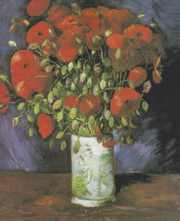 When I picked up painting again, I went straight into acrylic paint. It was fun and forgiving and I enjoyed the medium. Over the last couple of years, I have taken lessons in watercolour, pastels and gouache. I love various mediums, given I do mixed media, that is a good thing! For the last twelve months, I have been enjoying the medium of gouache. So what is gouache, I hear you ask. Gouache is a water-based paint not dissimilar to watercolour, it is however, matte, opaque and creamy. Being similar to watercolour, it is more opaque, which means you can layer from dark to light and correct mistakes. I love how the medium quickly dries to a matte finish, making it ideal for photographing, and scanning for prints and doesn't have that shine. As I have been venturing out on en plein air excursions, gouache is an ideal medium to take out and about. It is compact enough for a small palette, dries reasonably quickly and can be activated with water. I enjoy being able to sketch and then paint while I am out, sometimes in my sketchbook and sometimes on watercolour paper. These en plein air paintings are then reference guides for future work. The fact I can paint in the colours of the day is ideal to capture the moment, the shadows, the highlights and the essence of the session. Although you can paint larger paintings using gouache, it is often associated with smaller works from an A3 - A5 painting. Smaller work on A3 to A5 is ideal when you have limited time and space, making gouache the perfect medium. The artwork you see here is a small artwork on paper using gouache. This was done with an initial light translucent wash and then layered with a more creamy gouache texture to give depth to the piece. Have you heard of gouache or do you use it? Leave your comments below, I would love to see your comments. Featured Artwork: The outback shed
0 Comments
 Recently I was asked how many art classes I run. I totalled them up and this year it will be approximately 120 classes. I also attend classes weekly, sometimes if I can fit it in I will attend an extra class during the week. Being up the front and running a class is very different than being a participant, that's for sure. What I have learnt running the classes is everyone has their way of processing the reference they are replicating. Every person has their own style. You can have a room filled with ten people, all doing the same reference photo, yet, there are ten different interpretations. A part of the reason to factor in is experience. Art classes have a range of people with varying degrees of creating art. The main factor, I believe is our interpretation of the piece. There is no right or wrong, there is no good or bad. There is no perfect piece, there is no dreadful piece. When I sit as a student in an art class, I love the ability to learn from the teacher, experiment, practice and enjoy the process. Sometimes, my work at a class I would prefer to throw in the bin, yet I keep it to learn from it. I enjoy finding happy little accidents, solving problems and developing my skills for future work. I don't define myself by the work I produce in an art class. I do see from time to time, a person wanting to replicate the reference photo exactly, like a photocopy. They admonish themselves for not doing it correctly or right. Occasionally, there are silent tears and bright red faces as the person tries their hardest to find perfectionism in art. Emotions come to the surface of "I'm not good enough", "my art needs to be perfect", and "everyone else is better than me". Negative self-talk that serves no purpose and is definitely no good. Take Vincent van Gogh, one of the world's most renowned painters, yet he is synonymous with the term 'a tortured artist'. He died at the early age of 37 and sold only one painting. In ten years he produced almost 900 paintings and around 1100 works on paper. Sadly, Vincent didn't get to see how some of his works are the most expensive in the world, his art style laid the foundation for future artists and he was one of the most influential artists in the history of art. So, my biggest takeaway and advice if I may...... enjoy the class, learn the process, develop skills, use what you learn for future work and don't define your ability by what is done on the day. You do you, comparison kills creativity and joy. What are your thoughts on comparison and self-talk? Share your thoughts and leave a comment below.  van Gogh van Gogh In the art classes I run, I use photographs and artwork for students as inspiration. It is easier as a student to have a reference shot to learn techniques and to develop skills. So what if you are no longer a student and now creating your own artwork, can you still use reference shots? When you stumble upon a stunning artwork or photo that speaks to you, it can spark a flood of creative ideas. It might ignite your imagination, to assist you in developing your own unique creation. You may draw on elements of the reference be it the colours, composition, theme, or mark making and reshaping them through your eye and interpretation. When coming to creating your own artwork it is about making something that is uniquely your own. In the realm of creativity, using a photo or artwork for inspiration can be powerful as a reference for your own imaginative journey. It is about interpreting, reimagining, and creating something that has your stamp of style, voice and take on the piece. Personally, one of my favourite things to paint is flowers in vases. Whilst I may look at a van Gough for inspiration, for his use of light, colour and texture, I don't want to recreate his piece, I can do that with a photocopier or camera. I do however, want to look at his work and identify some of his prowess with the brush strokes, colour, texture and light, even seeing how I can incorporate some of his elements into my piece. Although imitation is the highest form of flattery, true creativity lies not in replication but in the ability to weave inspiration into something uniquely your own. No to mention, copyright laws. |
AuthorLee Cummins is a mixed media artist, workshop and art class facilitator. Archives
July 2024
Categories
All
|

 RSS Feed
RSS Feed
